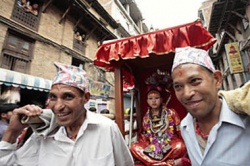Difference between revisions of "Vajracharya"
(Created page with "thumb|250px| A '''Bajracharya''' or '''Vajracharya''' is a Vajrayana Buddhist priest among the Newar communities of Nepal and ...") |
|||
| (8 intermediate revisions by 3 users not shown) | |||
| Line 1: | Line 1: | ||
[[File:QKUMARI_P1.jpg_full_380.jpg|thumb|250px|]] | [[File:QKUMARI_P1.jpg_full_380.jpg|thumb|250px|]] | ||
| − | |||
| − | |||
| − | The writers of ''Rebuilding Buddhism: The Theravada Movement in Twentieth-century Nepal'' explore the unusual relationship of the Vajracharyas and their assistant Shakyas with [[Buddhist monasticism]]: | + | |
| − | <blockquote>Unlike Vajracharyas, Shakya men may not be priests for others, but together with Vajracharya men they are the members of the traditional Newar Buddhist monasteries, known honorifically as vihara and colloquially as baha or bahi. In so far as Shakya and Vajracharya men filled their roles in the monastery, they were monks. In effect, they were married, part-time monks. | + | |
| + | A '''[[Bajracharya]]''' or '''[[Vajracharya]]''' is a [[Vajrayana Buddhist priest]] among the [[Newar]] communities of [[Nepal]] and a [[Revered Teacher]] who is highly attained in the [[Tibetan Buddhism|Tibetan]] and {{Wiki|Chinese}} [[Esoteric]] Schools. | ||
| + | |||
| + | [[Vajracharya]] means '[[vajra holding lama]]'. | ||
| + | |||
| + | |||
| + | They are also commonly called '''[[Guru-ju]]''' or '''[[Gu-bhaju]]''' (a short [[form]] for [[Guru Bhaju]]) which are {{Wiki|Nepali}} terms related to the [[Sanskrit]] term [[guru]], and translate as '[[teacher]]' or '[[priest]]'. | ||
| + | |||
| + | The [[Bajracharya]] is the [[highest]] ranking of the [[Newar]] castes that are born [[Buddhist]]. To become a professional [[Guruju]], a [[person]] of the [[bajracharya]] [[caste]] must go through a number of [[rituals]]. | ||
| + | |||
| + | The [[bajracharya]] boy goes through a [[ritualistic process of initiation]] known as ''[[Bajravishekha]]'', including shaving off the {{Wiki|head}} as the [[Buddhahood|buddha]] and asking for [[alms]], at a minimum of seven houses a day in different places, in the [[tradition]] of [[bhikku|monks]] since the [[time]] of [[Gautama Buddha]]. | ||
| + | |||
| + | A [[Vajracharya]] of the [[Hanmi Esoteric School]] is chosen because of his or her past [[life]] attainments and undergoes an intensive training and [[transmission]] with an [[Enlightened]] [[Master]] and ranks above a [[Rinpoche]] | ||
| + | |||
| + | Sometimes [[tantras|tantric]] [[Newar Buddhism]] and [[Esoteric Buddhism]] is referred to as '[[Vajracharya Buddhism]]'. | ||
| + | |||
| + | The writers of ''Rebuilding [[Buddhism]]: The [[Theravada]] {{Wiki|Movement}} in Twentieth-century [[Nepal]]'' explore the unusual relationship of the [[Vajracharyas]] and their assistant [[Shakyas]] with [[Buddhist monasticism]]: | ||
| + | |||
| + | |||
| + | <blockquote>Unlike [[Vajracharyas]], [[Shakya]] men may not be {{Wiki|priests}} for others, but together with [[Vajracharya]] men they are the members of the [[traditional]] [[Newar Buddhist monasteries]], known honorifically as [[vihara]] and colloquially as [[baha]] or [[bahi]]. | ||
| + | |||
| + | In so far as [[Shakya]] and [[Vajracharya]] men filled their roles in the [[monastery]], they were [[monks]]. In effect, they were married, part-time [[monks]]. | ||
</blockquote> | </blockquote> | ||
{{W}} | {{W}} | ||
| − | + | ||
| − | + | ||
[[Category:Newar]] | [[Category:Newar]] | ||
[[Category:Nepal]] | [[Category:Nepal]] | ||
| + | [[Category:Buddhist Titles]] | ||
| + | |||
| + | {{TibetanTerminology}} | ||
Latest revision as of 05:29, 18 December 2015
A Bajracharya or Vajracharya is a Vajrayana Buddhist priest among the Newar communities of Nepal and a Revered Teacher who is highly attained in the Tibetan and Chinese Esoteric Schools.
Vajracharya means 'vajra holding lama'.
They are also commonly called Guru-ju or Gu-bhaju (a short form for Guru Bhaju) which are Nepali terms related to the Sanskrit term guru, and translate as 'teacher' or 'priest'.
The Bajracharya is the highest ranking of the Newar castes that are born Buddhist. To become a professional Guruju, a person of the bajracharya caste must go through a number of rituals.
The bajracharya boy goes through a ritualistic process of initiation known as Bajravishekha, including shaving off the head as the buddha and asking for alms, at a minimum of seven houses a day in different places, in the tradition of monks since the time of Gautama Buddha.
A Vajracharya of the Hanmi Esoteric School is chosen because of his or her past life attainments and undergoes an intensive training and transmission with an Enlightened Master and ranks above a Rinpoche
Sometimes tantric Newar Buddhism and Esoteric Buddhism is referred to as 'Vajracharya Buddhism'.
The writers of Rebuilding Buddhism: The Theravada Movement in Twentieth-century Nepal explore the unusual relationship of the Vajracharyas and their assistant Shakyas with Buddhist monasticism:
Unlike Vajracharyas, Shakya men may not be priests for others, but together with Vajracharya men they are the members of the traditional Newar Buddhist monasteries, known honorifically as vihara and colloquially as baha or bahi.
In so far as Shakya and Vajracharya men filled their roles in the monastery, they were monks. In effect, they were married, part-time monks.
